-
 Bitcoin
Bitcoin $114400
1.32% -
 Ethereum
Ethereum $3499
2.20% -
 XRP
XRP $2.922
4.26% -
 Tether USDt
Tether USDt $0.0000
0.03% -
 BNB
BNB $752.6
1.53% -
 Solana
Solana $161.8
1.64% -
 USDC
USDC $0.9999
0.01% -
 TRON
TRON $0.3267
1.32% -
 Dogecoin
Dogecoin $0.1991
3.02% -
 Cardano
Cardano $0.7251
3.29% -
 Hyperliquid
Hyperliquid $38.32
3.36% -
 Stellar
Stellar $0.3972
7.58% -
 Sui
Sui $3.437
2.74% -
 Chainlink
Chainlink $16.29
3.65% -
 Bitcoin Cash
Bitcoin Cash $545.3
3.70% -
 Hedera
Hedera $0.2482
7.49% -
 Ethena USDe
Ethena USDe $1.001
0.03% -
 Avalanche
Avalanche $21.40
2.02% -
 Toncoin
Toncoin $3.579
1.56% -
 Litecoin
Litecoin $109.3
2.20% -
 UNUS SED LEO
UNUS SED LEO $8.951
-0.18% -
 Shiba Inu
Shiba Inu $0.00001220
2.75% -
 Polkadot
Polkadot $3.613
2.99% -
 Uniswap
Uniswap $9.173
3.78% -
 Monero
Monero $302.6
2.62% -
 Dai
Dai $0.0000
0.00% -
 Bitget Token
Bitget Token $4.320
1.52% -
 Pepe
Pepe $0.00001048
3.40% -
 Cronos
Cronos $0.1314
4.33% -
 Aave
Aave $259.4
3.54%
What is the difference between Bitcoin spot ETF and futures ETF?
Spot ETFs, which hold actual Bitcoins, provide direct exposure to the underlying asset with lower fees and greater liquidity.
Feb 25, 2025 at 08:30 pm
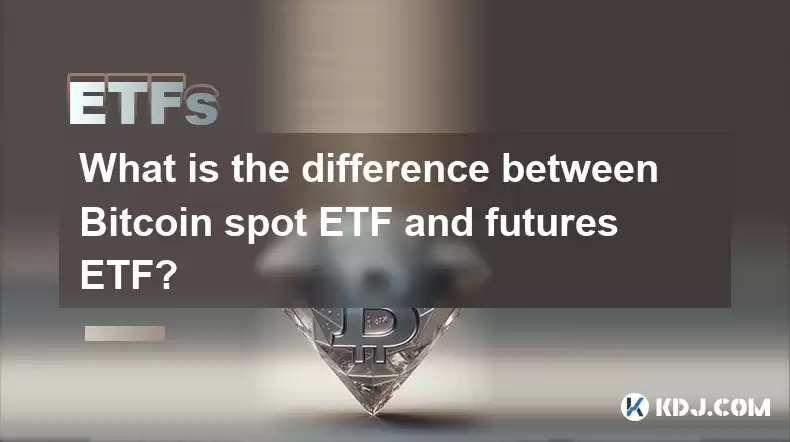
Key Points:
- Spot ETFs directly track the price of the underlying asset (e.g., Bitcoin).
- Futures ETFs track the price of futures contracts, which are agreements to buy or sell an asset at a predetermined price on a future date.
- Spot ETFs generally offer lower fees and greater liquidity.
- Futures ETFs are often more leveraged, offering potential for higher returns and risks.
- Both spot and futures ETFs can provide exposure to crypto assets without the need for direct investment or custody.
Bitcoin Spot ETFs
- Direct Exposure: Spot ETFs hold actual Bitcoins, providing direct ownership of the underlying asset.
- Real-Time Price Tracking: Spot ETFs are traded on exchanges and their prices fluctuate based on real-time Bitcoin market movements.
- Lower Fees: Spot ETFs typically have lower fees than futures ETFs due to their simplicity and lower trading volume.
- Higher Liquidity: Spot ETFs offer greater liquidity, making it easier for investors to trade shares without significantly affecting the market price.
Bitcoin Futures ETFs
- Exposure to Futures Contracts: Futures ETFs track the price of Bitcoin futures contracts, not the spot price of Bitcoin.
- Leverage: Futures ETFs often use leverage to magnify the potential returns and risks. This means that changes in the futures contract price are amplified in the ETF price.
- Midway Complexity: Futures ETFs are more complex than spot ETFs due to the involvement of futures contracts, which have specific trading rules and settlement dates.
- Lower Liquidity: Futures ETFs have lower trading volume and liquidity compared to spot ETFs.
Comparison Table
| Feature | Spot ETFs | Futures ETFs |
|---|---|---|
| Underlying Asset | Bitcoin | Bitcoin Futures Contracts |
| Exposure | Direct | Indirect |
| Fees | Lower | Higher |
| Liquidity | Higher | Lower |
| Complexity | Simpler | More Complex |
| Leverage | Not Leveraged | Often Leveraged |
FAQs
- Which ETF type is better? The choice between spot and futures ETFs depends on individual investment goals and risk tolerance. Spot ETFs offer direct exposure with lower fees and volatility, while futures ETFs provide leverage and the potential for higher returns.
- Are Bitcoin ETFs regulated? Yes, Bitcoin ETFs are regulated by the same financial authorities as traditional ETFs. They must meet strict listing and disclosure requirements.
- How to invest in Bitcoin ETFs? Bitcoin ETFs can be purchased through brokerage accounts similar to other ETFs.
- Can I buy Bitcoin directly through an ETF? Yes, spot ETFs allow you to indirectly hold Bitcoin without owning it directly.
- Is Bitcoin ETF trading 24/7? No, Bitcoin ETFs trade on traditional trading hours during weekdays.
Disclaimer:info@kdj.com
The information provided is not trading advice. kdj.com does not assume any responsibility for any investments made based on the information provided in this article. Cryptocurrencies are highly volatile and it is highly recommended that you invest with caution after thorough research!
If you believe that the content used on this website infringes your copyright, please contact us immediately (info@kdj.com) and we will delete it promptly.
- BCUT: Support Holds, Accumulation Hints at Potential Reversal
- 2025-08-04 10:50:12
- Bitcoin's Bullish Expansion: Decoding Bollinger Bands and Whale Bets
- 2025-08-04 10:55:12
- XRP, Solana, and Whales: Decoding the Crypto Tides
- 2025-08-04 11:10:11
- BlockDAG's Grand Finale: Auction Fever and the Dawn of a New Era
- 2025-08-04 10:30:12
- Kaia Files: Will South Korea Embrace a KRW-Pegged Stablecoin?
- 2025-08-04 10:30:12
- Kaspa, HBAR, and Cold Wallet: A New York Minute on Crypto's Latest Moves
- 2025-08-04 09:11:54
Related knowledge
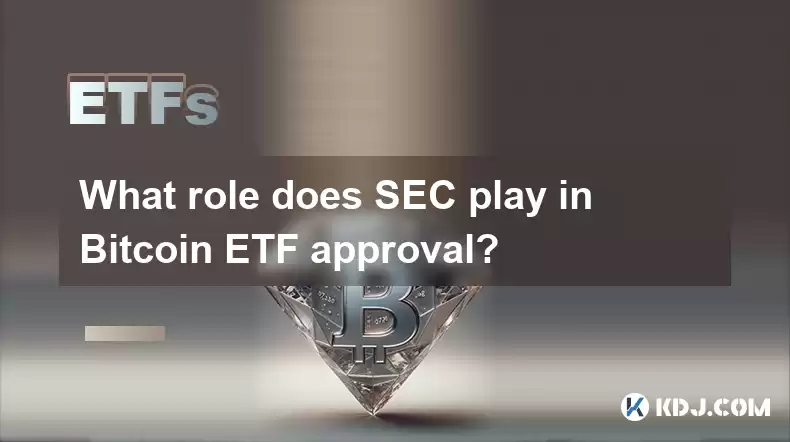
What role does SEC play in Bitcoin ETF approval?
Feb 25,2025 at 06:48am
Key Points:SEC's Role in Bitcoin ETF Approval ProcessHistorical Efforts to Establish a Bitcoin ETFSEC's Criteria for Bitcoin ETF ApprovalPotential Imp...
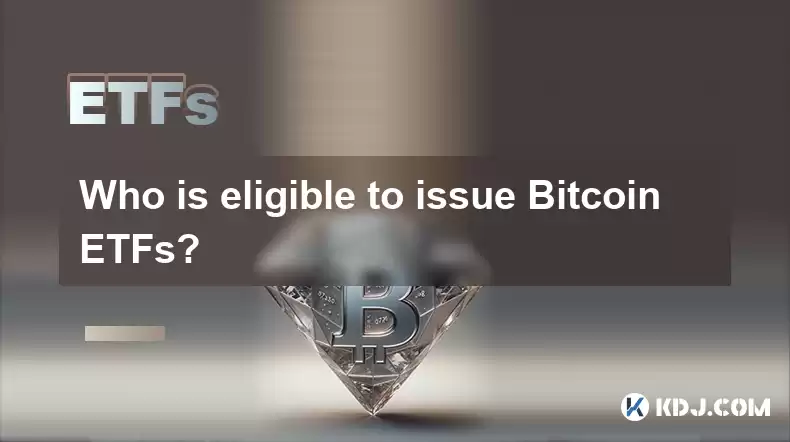
Who is eligible to issue Bitcoin ETFs?
Feb 25,2025 at 11:13am
Key Points:Only regulated financial institutions with the necessary expertise and infrastructure are eligible to issue Bitcoin ETFs.The Securities and...
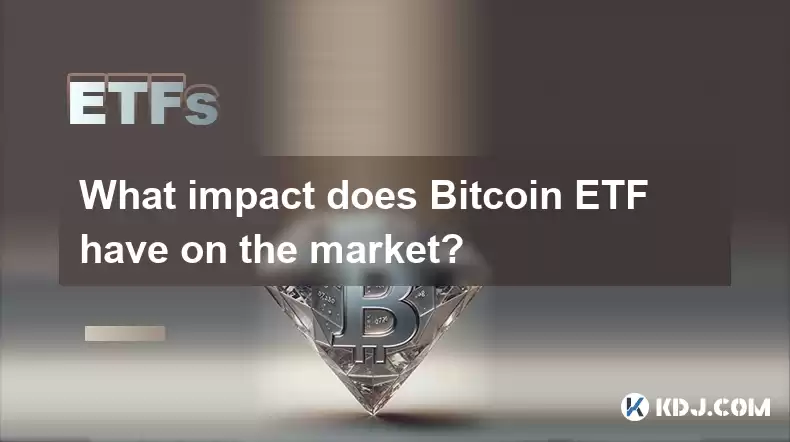
What impact does Bitcoin ETF have on the market?
Feb 25,2025 at 11:37am
Key Points:Introduction to Bitcoin ETFs and their role in the cryptocurrency marketHistorical development and performance of Bitcoin ETFsPotential ben...
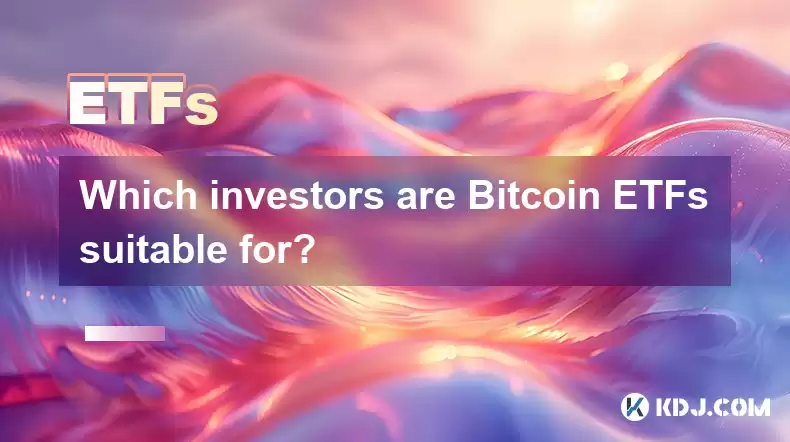
Which investors are Bitcoin ETFs suitable for?
Feb 27,2025 at 04:01pm
Key Points:Understanding Bitcoin ETFsBenefits of Bitcoin ETFsSuitability of Bitcoin ETFs for Different InvestorsAssessing Risk Tolerance and Investmen...
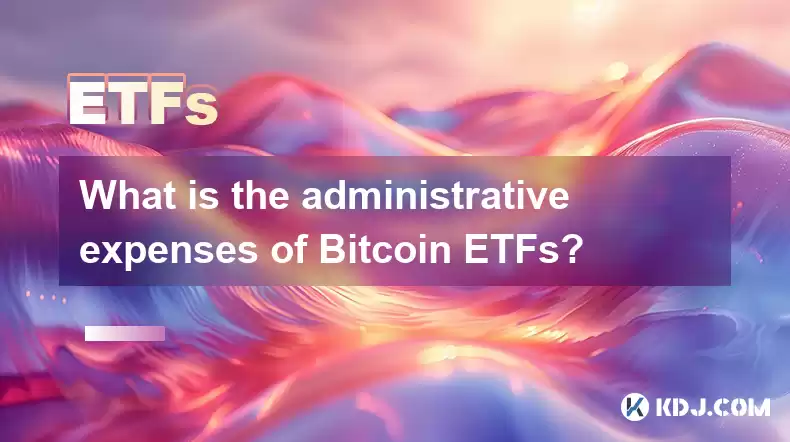
What is the administrative expenses of Bitcoin ETFs?
Feb 26,2025 at 12:24am
Key Points:Administrative expenses are a crucial factor to consider when evaluating Bitcoin ETFs.These expenses can significantly impact the performan...
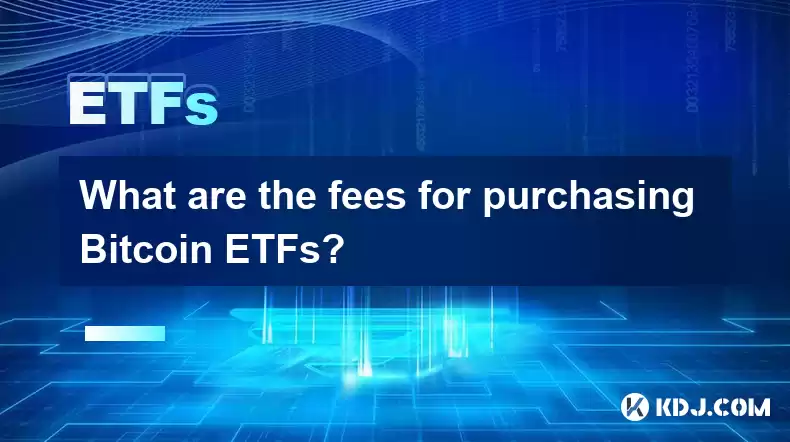
What are the fees for purchasing Bitcoin ETFs?
Feb 27,2025 at 07:13pm
Key Points:Bitcoin exchange-traded funds (ETFs) are a cost-effective and regulated way to gain exposure to Bitcoin.Fees associated with Bitcoin ETF pu...

What role does SEC play in Bitcoin ETF approval?
Feb 25,2025 at 06:48am
Key Points:SEC's Role in Bitcoin ETF Approval ProcessHistorical Efforts to Establish a Bitcoin ETFSEC's Criteria for Bitcoin ETF ApprovalPotential Imp...

Who is eligible to issue Bitcoin ETFs?
Feb 25,2025 at 11:13am
Key Points:Only regulated financial institutions with the necessary expertise and infrastructure are eligible to issue Bitcoin ETFs.The Securities and...

What impact does Bitcoin ETF have on the market?
Feb 25,2025 at 11:37am
Key Points:Introduction to Bitcoin ETFs and their role in the cryptocurrency marketHistorical development and performance of Bitcoin ETFsPotential ben...

Which investors are Bitcoin ETFs suitable for?
Feb 27,2025 at 04:01pm
Key Points:Understanding Bitcoin ETFsBenefits of Bitcoin ETFsSuitability of Bitcoin ETFs for Different InvestorsAssessing Risk Tolerance and Investmen...

What is the administrative expenses of Bitcoin ETFs?
Feb 26,2025 at 12:24am
Key Points:Administrative expenses are a crucial factor to consider when evaluating Bitcoin ETFs.These expenses can significantly impact the performan...

What are the fees for purchasing Bitcoin ETFs?
Feb 27,2025 at 07:13pm
Key Points:Bitcoin exchange-traded funds (ETFs) are a cost-effective and regulated way to gain exposure to Bitcoin.Fees associated with Bitcoin ETF pu...
See all articles

























































































